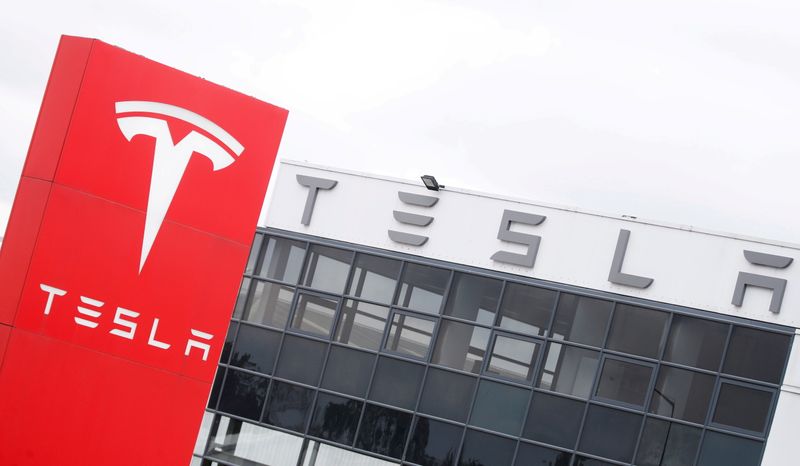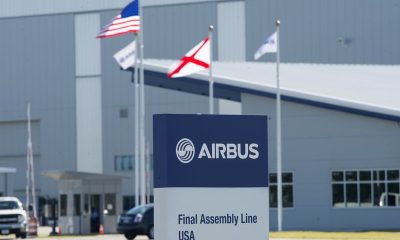Investing
This week in EVs: Price hikes and pay bumps | Pro Recap

© Reuters
Here is your weekly Pro Recap of the past week’s biggest headlines in the electric vehicle space: Tesla’s China price change; Ford resumes construction; and VW boosts wages.
Get news like this in real-time by signing up for InvestingPro.
Tesla TSLA increases Model Y price in China
Electric vehicle (EV) giant, Tesla Inc (NASDAQ:) announced Tuesday that it has increased the price of its Model Y Long Range Dual Motor All-Wheel Drive (AWD) in China, indicating a healthy appetite for the all-electric crossover.
According to Tesla China’s announcement on local social media platforms, the Model Y Long Range now carries an increased price tag of RMB 304,400 ($42,741), up by RMB 2,000 yuan ($280) from its previous price.
Previously listed at RMB 302,400 ($42,460), the recent increase translates to a modest 0.66% rise in the Model Y Long Range’s price. This latest adjustment is the fourth within a month by Tesla China.
In late October, Tesla raised the price of its Model Y Performance by RMB 14,000 ($1,965). The adjustment was followed by additional adjustments to the company’s Model 3 Long Range and Model Y Long Range on November 9th. Tesla followed those adjustments by raising the price of its Model 3 Rear Wheel Drive and Model Y Rear Wheel Drive on November 14th.
However, unlike past changes silently made on the official order pages, these adjustments were notably pre-announced.
Some industry observers believe this strategy aims to stimulate immediate purchases, leveraging media communication to encourage swift customer action amidst Tesla’s evolving pricing structure.
Shares of TSLA ended the week up 0.569% on Friday.
Unlock the potential of InvestingPro for up to 55% off this Black Friday and never miss out on a market winner again.
Ford resumes factory construction
Also announced Tuesday, Ford Motor Company (NYSE:) will resume construction of their factory near Marshall, Michigan, after being paused for two months.
Ford will own the factory, and has agreed to give the United Auto Workers the opportunity to organize the plant’s workers without a vote.
The U.S. automaker plans to use the facility to produce low-cost lithium-iron batteries starting in 2026. The batteries will be produced using technology based on a licensing agreement with CATL.
The company’s ties with CATL has drawn negative attention from U.S. lawmakers. Some government officials are opposed to the idea of American subsidies benefitting a Chinese entity such as CATL.
Representative Mike Gallagher, a Republican who chairs House committee on China, spoke on Tuesday, expressing his disappointment in Ford’s reported decision.
“The American people deserve better from an iconic U.S. company that receives massive taxpayer subsidies. Ford needs to call off this unethical deal for good,” Gallagher said.
The Detroit automaker also announced that the company is scaling back its plans for the Blue Oval Battery Park in Michigan. They were going to spend $3.5 billion to make batteries and hire 2,500 people.
Ford now plans to cut the Michigan battery plant’s capacity to 20 gigawatt hours and reduce hiring to 1,700.
Ford spokesman, Mark Truby said that Ford will also scale back its capital investment. However, Truby did not give an exact figure on the capital reduction, he indicated the total investment will be proportional to the 40% reduction in capacity. A proportional reduction would lead to a new investment price of around $2 bilion.
Shares of F ended the week up 1.057% on Friday.
VW boosts pay following UAW gains
German automaker, Volkswagen AG VZO O.N. (ETR:) announced Wednesday that the car company is implementing a pay bump for their production workers at the Chattanooga plant in Tennessee by 11%.
Volkswagen and other car companies in the U.S. that aren’t part of a union are feeling pressured to improve pay and benefits after the United Autoworkers (UAW) secured some major concessions in their newest labor contract following a six-week strike against the Detroit Three.
Honda Motor Co Ltd ADR (NYSE:) and Toyota Motor (NYSE:), both non-union companies, have also increased wages for their factory workers in the U.S. The moves coincide with signs that the union might be eyeing foreign-owned auto plants, like Tesla’s, for potential unionizing efforts.
Hyundai Motor Co DRC (OTC:) has also declared plans to raise wages by 25% over the next four years for their non-union workers in Alabama and Georgia.
Volkswagen’s pay hike kicks in from December, and they’re rolling out a quicker wage progression starting in February.
Read the full article here

-

 Side Hustles7 days ago
Side Hustles7 days agoMicrosoft Is About to Begin Job Cuts. Here’s Why.
-

 Make Money6 days ago
Make Money6 days ago10 Critical Questions to Ask Your Financial Advisor Now
-

 Make Money5 days ago
Make Money5 days ago10 Ways to Make Money As a Graphic Designer
-

 Investing7 days ago
Investing7 days agoWhat CMOs Need to Know About AI Adoption in Marketing Teams
-

 Personal Finance4 days ago
Personal Finance4 days agoIf you are 60 years old, new 401(k) rules could save you money
-

 Investing5 days ago
Investing5 days agoCould Easier Cancellations Build Customer Loyalty?
-

 Side Hustles7 days ago
Side Hustles7 days agoJPMorgan to Implement a Five-Day Return-to-Office Mandate
-

 Investing6 days ago
Investing6 days agoAirbus keeps top spot with 766 jet deliveries in 2024 By Reuters



















